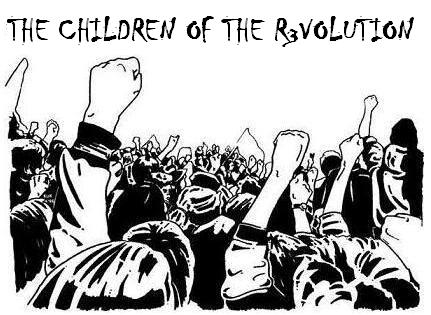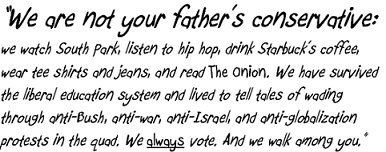 Labor unions are obsolete.
Labor unions are obsolete.We’ve come a long way from the Industrial Revolution of the 19th Century, during which child labor was rampant, working conditions were a disgrace, wages were a pittance, and workers themselves were treated like raw material rather than human beings. The United States has instituted legal reforms over the last century that have put an end to all of it, mandating standards in the workplace, equal opportunity and sexual harassment training, and the ever-increasing minimum wage. To be sure, trade unions and organized labor were a driving force behind the institution of these reforms. But like many progressive movements, they refused to ride off into the sunset upon the realization of their goals. Instead, they set new, higher goals; goals that are straining our economy to its breaking point.
Where they once promoted necessary social change, labor unions have become extortion rackets (indeed, American racketeering statutes include an exemption for labor unions). They collect payments from their membership and in return promise to protect them from the greedy corporate leadership. When they want a raise or better benefits, they demand it. When they don’t get it, they strike, usually shutting down their industry and damaging the economy (I believe the mafia follows the same model, but they use bats, bombs and ice picks rather than picket signs). They are not promoting progressive ideals, but rather pushing their employers to hand over concessions above and beyond what current market conditions deem profitable. This is pure thuggery, and it’s eroding the country’s competitive edge.
The most visible example of union strong-arming run amok is the state of America’s Big Three automakers. While the United Auto Workers union tries to muddy the waters and obfuscate with some fuzzy math about their wages, it comes down to the fact that UAW benefits have seriously hamstrung the Big Three’s ability to turn a profit. Part of the benefits package they demanded from the automakers was a program called the Jobs Bank Program, in which union members who were laid off received full salary and benefits while unemployed. This program was only recently suspended as a concession during bailout negotiations. If someone can explain to me why a company should pay for laid-off employees not to work then they get a gold star. This sort of excess is all that the unions seem to have left to fight for, because they’ve already got a guaranteed minimum wage, worker safety standards, a government unemployment program, equal opportunity standards, and the departments and bureaucracies that back those policies up with lengthy audits, investigations and lawsuits. What’s left? To extort employers for frivolous benefits, I suppose. Otherwise they shrink into irrelevance where they belong.
Take the example of the teachers union. One of the greatest obstacles to education reform, they have created a system in which underperforming teachers are protected at the expense not only of the school district at large but the students themselves. The National Education Association, which is the largest American teachers union, has opposed such reform measures as merit pay, school vouchers and tenure reform. The NEA, like many labor unions, has taken the stance that it favors its workers over the health of their industry. In the end, this perspective is worse than short-sighted. It is suicidal. These protectionist policies will invariably lead, as they are with the auto industry, to a cataclysmic collapse that will leave even union members jobless (unless, of course, the government bails them out).
The solution to this whole mess has to lie with the workers themselves who join these unions. Given the current state of things, would you rather have gainful, long-term employment or participate in a labor mafia that picks your pocket and kills your industry but offers phenomenal benefits?







4 comments:
I whole-heartedly concur with your analysis of the nessecity for unions a century ago and their subsequent lack of purpose today.
I also agree with your conclusion that the people with the real power to keep unions from sabotaging the jobs of the employees they claim to represent are those laborers themselves.
That latter fact is why the next Congress, distinctly pro-union and anti-employee, is expected to act swiftly on what is called the "Employee Free Choice Act". Quite in spite of its name, the proposed legislation removes employees right to a secret ballot in determining whether or not to form a union. With pro-union sentiment and overall union membership in serious decline, the bill is specifically designed to grant union organizers the ability to trump the will of the employees they claim to represent.
The concept is ludicrous, and frankly, unconstitutional. The Federal Government has no right or authority to bind the will of an individual to some group merely because the group claims to serve that individual's best interest. If that individual votes to form a union, fine - at least it is their choice. You can't just indendture the labor force to union leaders becase the democratic process is slowly disolving the unions. I sincerely hope this madness does not get off the ground.
Economic reality will ultimately bring about the demise of the unions in the private sector. It may not happen under the Obama administration, but they have been collapsing under their own weight for decades. The real long-term threat to our economic well being are the public employees unions. The unfunded pension obligations for state and local employees makes the automakers problems look like chump change.
By simple accounting unions cannot get more money out of companies than they can afford (except in the very very short term).
Economically the productivity of American workers has been going up continuously. But the median income has recently stagnated. I think the decline of union bargaining has resulted in keeping everyone's wages low.
Teacher and other government unionized jobs pay worse but have better pensions and job security. If you increase the pay then you could change the trade off. Public teacher salaries in American are really much lower than in other countries; taxpayers are not as generous here. So I take the argument against teacher unions to be identical to arguing that we should increase taxes to pay teachers more. In California this would necessarily mean the end of prop 13.
Chris K,
I would agree, teachers should be paid more, though not necessarily through a tax increase, but rather through skillful budget reallocation and cutting wasteful programs. If we are to have public education, then we ought to be offering pay commensurate with the level of intelligence we need in our teachers.
On the flip-side, teachers should likewise be subject to the sort of scrutiny that higher salaries demand, and should be subject to termination if they are unable to produce educated children.
Then again, we could always just get rid public education and sidestep the issue altogether :)
Post a Comment